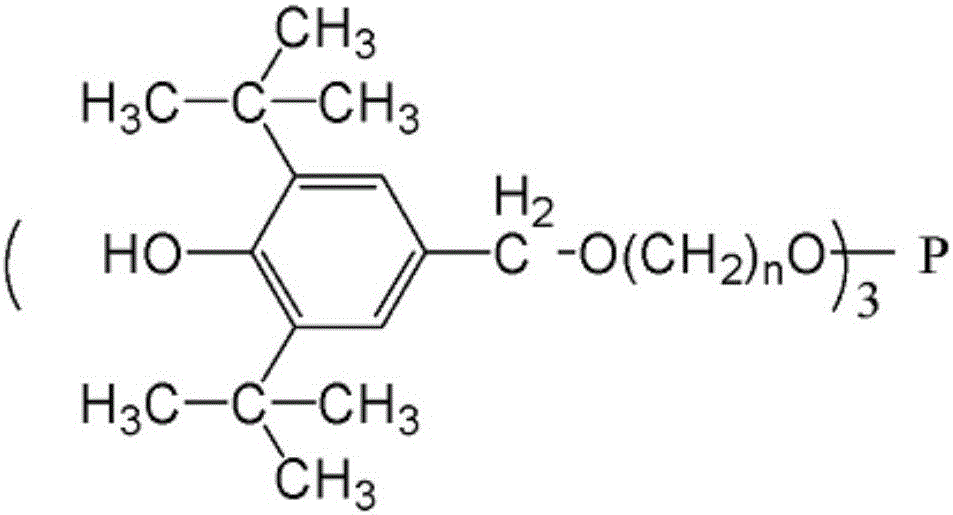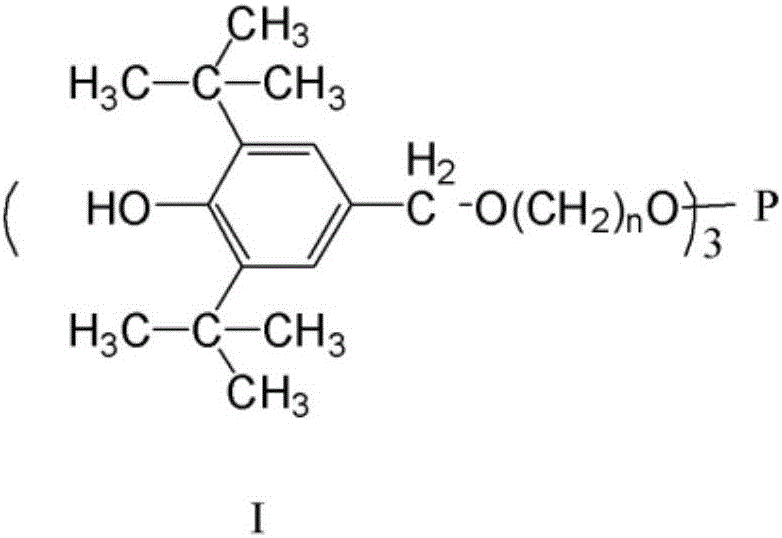A kind of antioxidant compound containing bifunctional group and its synthetic method
A synthesis method and a technology of bifunctional groups, applied in the field of antioxidant compounds and their synthesis, can solve the problems of difficult control of distance, low content of functional groups, and influence on antioxidant effect, and achieve the effect of easy purification and high yield
- Summary
- Abstract
- Description
- Claims
- Application Information
AI Technical Summary
Problems solved by technology
Method used
Image
Examples
Embodiment 1
[0063] Under nitrogen protection, 220g of 2,6-di-tert-butyl-p-cresol and 150g of dimethyl sulfate were dissolved in 2.5L of dry chloroform. The reaction solution was heated to 60° C. under stirring in a 5 L three-necked flask, and the reaction continued for 1.5 hours. After cooling the reaction liquid to 25°C, it was repeatedly extracted four times with 1 L of 0.5 mol / L potassium carbonate solution, and the organic layer was dried with anhydrous magnesium sulfate for 24 hours. The anhydrous magnesium sulfate desiccant in the solution was removed by filtration, and the solution was evaporated to dryness under low temperature to obtain 215.3 g of 2,6-di-tert-butyl-p-methylanisole, with a yield of 92%.
[0064] Under nitrogen protection, 215.3g of 2,6-di-tert-butyl-p-methylanisole was added into a 5L three-necked flask containing 3L of carbon tetrachloride. Then add 161g of N-bromosuccinimide and 2g of azobisisobutyronitrile, heat the reaction solution to 77°C for 3 hours and st...
Embodiment 2
[0069] Under nitrogen protection, 220g of 2,6-di-tert-butyl-p-cresol and 150g of dimethyl sulfate were dissolved in 2.3L of dry chlorobenzene. The reaction solution was heated to 60° C. under stirring in a 5 L three-necked flask, and the reaction continued for 1.5 hours. After cooling the reaction liquid to 25°C, it was repeatedly extracted four times with 1 L of 0.5 mol / L potassium carbonate solution, and the organic layer was dried with anhydrous magnesium sulfate for 24 hours. The anhydrous magnesium sulfate desiccant in the solution was removed by filtration, and the solution was evaporated to dryness under low temperature to obtain 215.3 g of 2,6-di-tert-butyl-p-methylanisole, with a yield of 92%.
[0070] Under nitrogen protection, 215.3g of 2,6-di-tert-butyl-p-methylanisole was added into a 5L three-necked flask containing 3L of carbon tetrachloride. Then add 161g of N-bromosuccinimide and 2g of azobisisobutyronitrile, heat the reaction solution to 77°C for 3 hours, st...
Embodiment 3
[0075] Under nitrogen protection, 220g of 2,6-di-tert-butyl-p-cresol and 150g of dimethyl sulfate were dissolved in 2.0L of dry dichloromethane. The reaction solution was heated to 60° C. under stirring in a 5 L three-necked flask, and the reaction continued for 1.5 hours. After cooling the reaction liquid to 25°C, it was repeatedly extracted four times with 1 L of 0.5 mol / L potassium carbonate solution, and the organic layer was dried with anhydrous magnesium sulfate for 24 hours. The anhydrous magnesium sulfate desiccant in the solution was removed by filtration, and the solution was evaporated to dryness under low temperature to obtain 215.3 g of 2,6-di-tert-butyl-p-methylanisole, with a yield of 92%.
[0076] Under nitrogen protection, 215.3g of 2,6-di-tert-butyl-p-methylanisole was added into a 5L three-necked flask containing 3L of carbon tetrachloride. Then add 161g of N-bromosuccinimide and 2g of azobisisobutyronitrile, heat the reaction solution to 77°C for 3 hours a...
PUM
 Login to View More
Login to View More Abstract
Description
Claims
Application Information
 Login to View More
Login to View More - R&D
- Intellectual Property
- Life Sciences
- Materials
- Tech Scout
- Unparalleled Data Quality
- Higher Quality Content
- 60% Fewer Hallucinations
Browse by: Latest US Patents, China's latest patents, Technical Efficacy Thesaurus, Application Domain, Technology Topic, Popular Technical Reports.
© 2025 PatSnap. All rights reserved.Legal|Privacy policy|Modern Slavery Act Transparency Statement|Sitemap|About US| Contact US: help@patsnap.com



